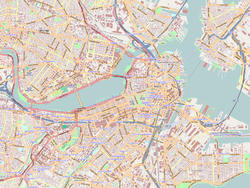
A National Historic Landmark (NHL) is a building, district, object, site, or structure that is officially recognized by the United States government for its outstanding historical significance. Only some 2,500, or roughly three percent, of over 90,000 places listed on the country's National Register of Historic Places (NRHP) are recognized as National Historic Landmarks.
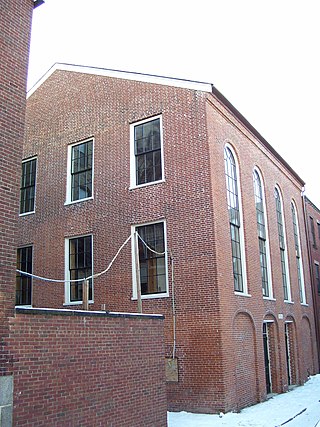
The African Meeting House, also known variously as First African Baptist Church, First Independent Baptist Church and the Belknap Street Church, was built in 1806 and is now the oldest black church edifice still standing in the United States. A Baptist congregation led by Reverend Thomas Paul built the church. The church also established a school, at first holding classes in its basement. After serving most of the nineteenth century as a church, it then served as a synagogue until 1972 when it was purchased for the Museum of African American History. It is located in the Beacon Hill neighborhood of Boston, Massachusetts, adjacent to the historically Black American Abiel Smith School, now also part of the museum. It is a National Historic Landmark.

This is a list of the National Register of Historic Places listings in Suffolk County, Massachusetts.

Christ Church, at Zero Garden Street in Cambridge, Massachusetts, U.S., is a parish of the Episcopal Diocese of Massachusetts. Built in 1760–61, it was designated a National Historic Landmark as one of the few buildings unambiguously attributable to Peter Harrison, the first formally trained architect to work in the British colonies.

The Ames Building is located in Boston, Massachusetts. It is sometimes ranked as the tallest building in Boston from its completion in 1889 until 1915, when the Custom House Tower was built, but the steeple of the 1867 Church of the Covenant was much taller than the Ames Building. It is nevertheless considered Boston's first skyscraper. In 2007, the building was converted from office space to a luxury hotel. In 2020, the building was purchased by Suffolk University and converted into a student residence hall.

The Church of the Covenant is a historic church at 67 Newbury Street in the Back Bay neighborhood of Boston, Massachusetts. A National Historic Landmark, it was built in 1865-1867 by the Central Congregational Church, and is now affiliated with the Presbyterian Church and the United Church of Christ. The church was designed by Richard M. Upjohn, and its distinctive interior is largely the work of Tiffany & Co.
The following properties are listed on the National Register of Historic Places in Arlington, Massachusetts.
This National Park Service list is complete through NPS recent listings posted December 20, 2024.

The First Universalist Church is a historic church building on the corner of Pleasant, Elm, and Spring Streets in Auburn, Maine. It was built in 1876 to a design by John Stevens of Boston, Massachusetts, and has been a significant landmark in the city since its construction. It is a fine local example of Gothic Revival architecture executed in brick, and was listed on the National Register of Historic Places in 1979.

The First Baptist Church is a historic American Baptist Churches USA congregation, established in 1665. It is one of the oldest Baptist churches in the United States. It first met secretly in members homes, and the doors of the first church were nailed shut by a decree from the Puritans in March 1680. The church was forced to move to Noddle's Island. The church was forced to be disguised as a tavern and members traveled by water to worship. Rev. Dr. Stillman led the church in the North End for over 40 years, from 1764 to 1807. The church moved to Beacon Hill in 1854, where it was the tallest steeple in the city. After a slow demise under Rev. Dr. Rollin Heber Neale, the church briefly joined with the Shawmut Ave. Church, and the Warren Avenue Tabernacle, and merged and bought the current church in 1881, for $100,000.00. Since 1882 it has been located at the corner of Commonwealth Avenue and Clarendon Street in the Back Bay. The interior is currently a pending Boston Landmark through the Boston Landmarks Commission.

The Boylston Building is an historic building at 2–22 Boylston Street in Boston, Massachusetts. The six-story sandstone building was designed by Carl Fehmer and built in 1887 by Woodbury & Leighton. It is an early instance in Boston of a skeleton-built commercial structure, rather than having load-bearing masonry walls. The building housed the Boylston Market, a wholesale trading exchange which had been on the site since 1810.

The Dimock Community Health Center Complex is a historic medical complex at 41 and 55 Dimock Street in Boston, Massachusetts.
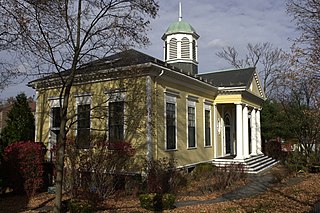
Oak Square School is a historic school building at 35 Nonantum Street in Brighton, Massachusetts, a neighborhood of Boston, Massachusetts.
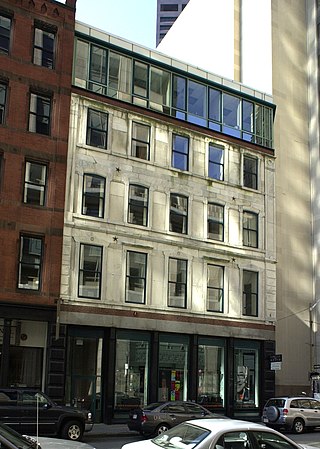
The Richardson Block is a historic block of commercial buildings at 113-151 Pearl and 109-119 High Streets in Boston, Massachusetts. It consists of a series of buildings constructed in the aftermath of the Great Boston Fire of 1872. The first of these buildings, at the corner of Pearl and High Streets, was designed by William Preston and built in 1873 for Jeffrey Richardson, using granite and brick salvaged from buildings that had previously stood on the site. The area was an important locus of the leather goods business both before and after the fire, and the buildings constructed after the fire are among the only neo-Greek commercial structures standing in Boston's Financial District.

This is a list of the National Register of Historic Places listings in Lynn, Massachusetts.
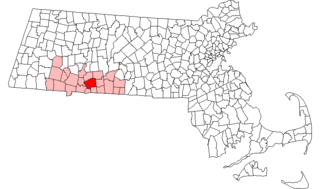
This is a list of the National Register of Historic Places listings in Springfield, Massachusetts.
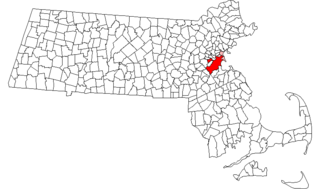
Boston, Massachusetts is home to many listings on the National Register of Historic Places. This list encompasses those locations that are located north of the Massachusetts Turnpike. See National Register of Historic Places listings in southern Boston for listings south of the Turnpike. Properties and districts located elsewhere in Suffolk County's other three municipalities are also listed separately.

Boston, Massachusetts is home to many listings on the National Register of Historic Places. This list encompasses those locations that are located south of the Massachusetts Turnpike. See National Register of Historic Places listings in northern Boston for listings north of the Turnpike. Properties and districts located elsewhere in Suffolk County's other three municipalities are also listed separately.


